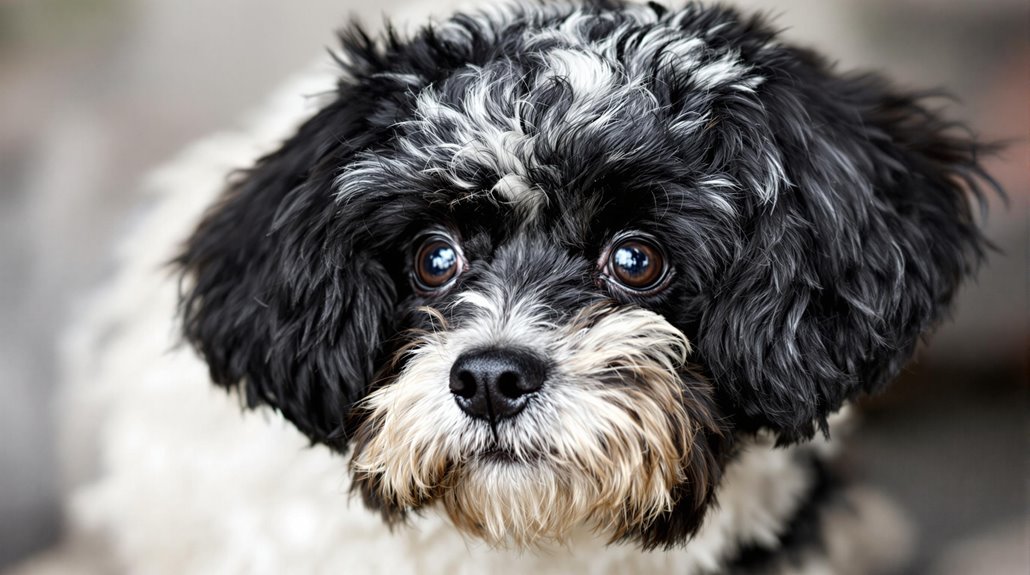The Bossi-Poo is indeed a deliberate hybrid cross between a Boston Terrier and a Poodle, emerging in the 1990s during the designer dog movement. You'll find these dogs display a mix of physical traits from both parent breeds, including heights of 9-18 inches and weights of 8-60 pounds. They typically inherit the Poodle's intelligence and the Boston Terrier's friendly personality, making them excellent family companions. While they're not recognized as a purebred breed, they're acknowledged by several designer dog registries. Their care requirements, health considerations, and temperament characteristics vary based on which parent breed's genes are more dominant.
Origins of the Bossi-Poo

Combining two beloved breeds, the Bossi-Poo emerged as a designer dog that blends the Boston Terrier's charm with the Poodle's intelligence. You'll find that this hybrid breed represents a fascinating intersection of canine history, with roots stretching back to both 19th-century Boston and 15th-century Europe.
While the Boston Terrier originated in Massachusetts during the 1800s, the Poodle's heritage as a water retrieval dog dates much further back. You'll notice that today's Bossi-Poo inherits traits from both of these distinguished lineages, though their appearance can vary greatly depending on which Poodle size variant is used in breeding.
Unlike many established breeds, you won't find standardized breeding programs for the Bossi-Poo. This means that when you're looking at these dogs, you'll see considerable variation even among puppies from the same litter. The breed's development focuses on creating companion animals that combine:
- The Boston Terrier's friendly personality
- The Poodle's renowned intelligence
- A size range that varies based on the Poodle parent (Toy, Miniature, or Standard)
- A temperament suited for family life
Physical Traits and Appearance
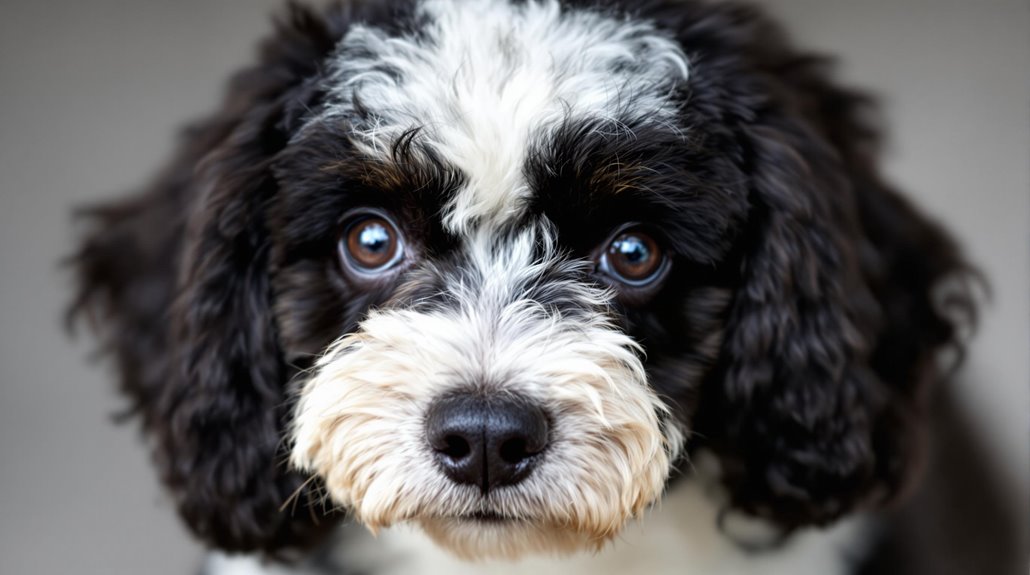
A mirror reflects endless possibilities when it comes to the Bossi-Poo's appearance, as these dogs can inherit diverse physical traits from both parent breeds. You'll find these Boston Terrier-Poodle mix dogs displaying a fascinating range of characteristics that can vary remarkably, even among puppies from the same litter.
When you're looking at a Bossi-Poo's physical traits, you'll notice:
- Size variations from 9 to 18 inches in height and 8 to 60 pounds in weight, depending on the Poodle parent's size classification
- Coat textures ranging from curly to wavy or straight
- Color combinations including black, white, and brown, sometimes featuring the classic Boston Terrier tuxedo pattern
- Rounded heads and expressive, floppy ears that blend features from both parent breeds
You'll discover that each Bossi-Poo's appearance is uniquely their own, making them special companions for families seeking distinctive pets. Their varied physical characteristics stem from the genetic lottery of mixed breeding, ensuring that you'll never find two Bossi-Poos that look exactly alike.
Personality and Behavioral Characteristics
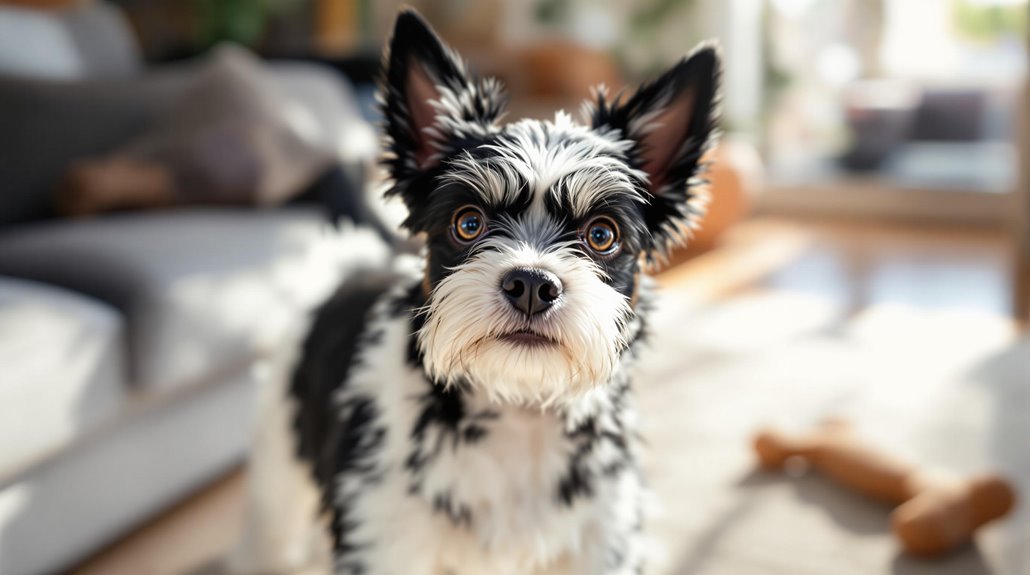
Personality powerhouses, Bossi-Poos blend the cheerful disposition of Boston Terriers with the sharp intelligence of Poodles. You'll find these delightful dogs forming strong bonds with their families while maintaining their friendly nature toward everyone they meet.
When it comes to training, you'll appreciate their quick-learning abilities and willingness to please. They respond exceptionally well to positive reinforcement, though you'll need to stay patient with their occasional stubborn streak. Establishing consistent training routines early on will help you manage their cleverness effectively.
Key Personality Traits:
- Highly sociable and affectionate with family members
- Intelligent and responsive to training commands
- Playful and energetic, requiring regular mental stimulation
- Sometimes stubborn, needing firm but gentle guidance
For the best results with your Bossi-Poo's development:
- Dedicate 30-60 minutes daily to exercise
- Implement early socialization with children and other pets
- Use positive reinforcement training methods
- Provide mental enrichment through games and training activities
With proper training and socialization, you'll find your Bossi-Poo becomes a well-adjusted, loving companion who brings joy to your household.
Health Concerns to Watch For

While Bossi-Poos generally enjoy robust health, they inherit several potential health concerns from their parent breeds that you'll need to monitor. As a responsible owner, you'll want to stay vigilant about common issues affecting these mixed-breed dogs.
Your Bossi-Poo may face these specific health challenges:
- Eye conditions, including glaucoma and cataracts, which require regular screening
- Joint problems such as hip dysplasia and patellar luxation that can affect mobility
- Genetic conditions like Addison's disease and epilepsy that need ongoing management
- Heart-related issues that demand routine veterinary assessment
To guarantee your Bossi-Poo lives a healthy life spanning 10-15 years, you'll need to:
- Schedule regular veterinary check-ups for early detection of potential problems
- Maintain a consistent exercise routine to prevent obesity
- Feed a balanced, nutritious diet appropriate for their age and activity level
- Monitor their weight to reduce strain on joints
- Keep detailed health records to track any developing issues
Remember that prevention is essential – addressing health issues early through routine screenings and maintaining a healthy lifestyle will help your Bossi-Poo thrive.
Exercise and Training Requirements
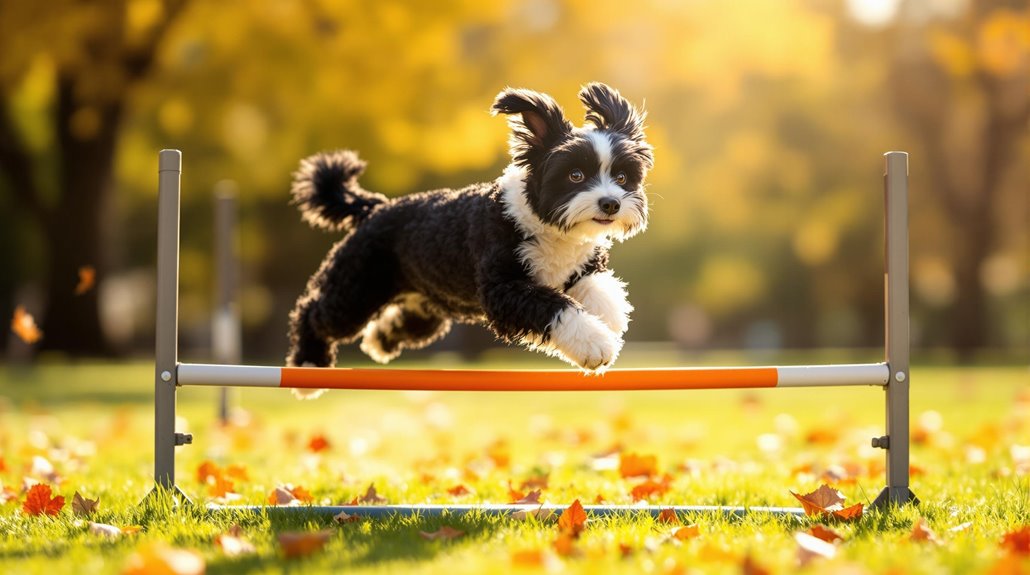
Intelligent and energetic Bossi-Poos thrive on regular physical activity and mental challenges to maintain their well-being. You'll need to dedicate 30 to 60 minutes each day to exercise your pup through engaging activities like walks, fetch games, or agility training.
To guarantee your Bossi-Poo grows into a well-adjusted companion, focus on these key training areas:
- Daily Exercise
- Schedule consistent walking routines
- Incorporate interactive play sessions
- Set up backyard agility courses
- Mix up activities to prevent boredom
- Mental Stimulation
- Provide puzzle toys and brain games
- Use treat-dispensing toys
- Rotate toys regularly to maintain interest
- Include training exercises during playtime
- Training Approach
- Start socialization early with people and pets
- Use positive reinforcement consistently
- Keep training sessions short and fun
- Reward good behavior with treats and praise
Your Bossi-Poo's high trainability makes them excellent students, but they need both physical exercise and mental challenges to stay happy. By combining regular exercise with structured training and enrichment activities, you'll help prevent destructive behaviors while building a strong bond with your pet.
Grooming and Care Guidelines
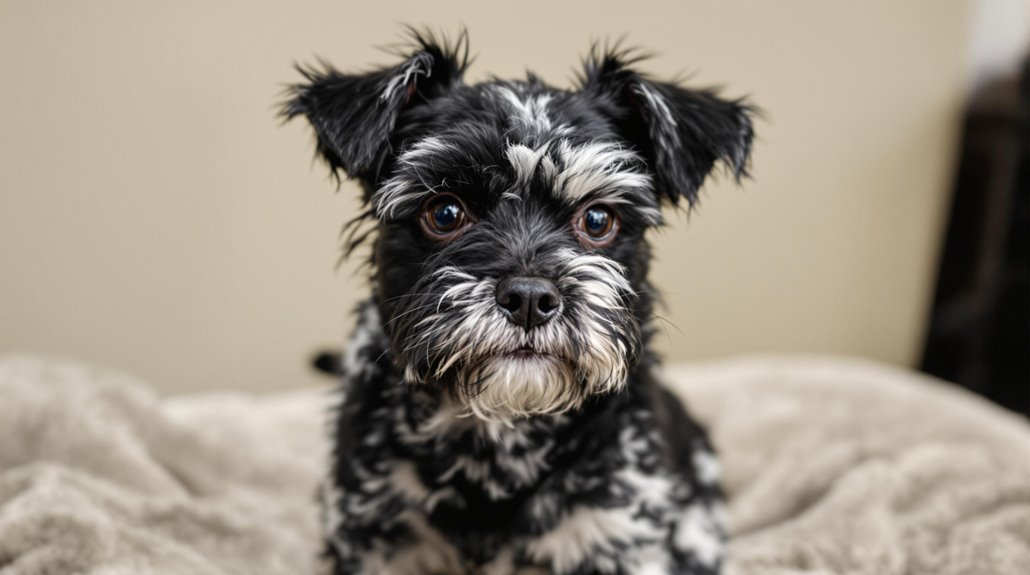
Beyond physical exercise, your Bossi-Poo needs consistent grooming to stay healthy and comfortable. You'll need to assess your dog's coat type, as it can vary between wavy and curly, to establish the right grooming routine.
For most Bossi-Poos, you'll want to implement these vital care practices:
- Brush your dog's coat 1-2 times weekly, increasing frequency for curlier coats
- Clean the ears regularly to prevent potential health conditions
- Trim nails every few weeks or when you hear clicking on the floor
- Brush teeth several times per week to maintain dental hygiene
Your grooming schedule may need adjustment based on your dog's specific coat inheritance. If your Bossi-Poo has more Poodle-like fur, you'll need more frequent brushing to prevent matting. For dogs with straighter coats, weekly maintenance might suffice.
Remember that proper nutrition plays a vital role in coat health. Provide high-quality food and fresh water to maintain your dog's coat shine and texture. Bathe your Bossi-Poo when necessary, but avoid over-bathing to prevent skin irritation and natural oil depletion.
Finding Your Perfect Bossi-Poo
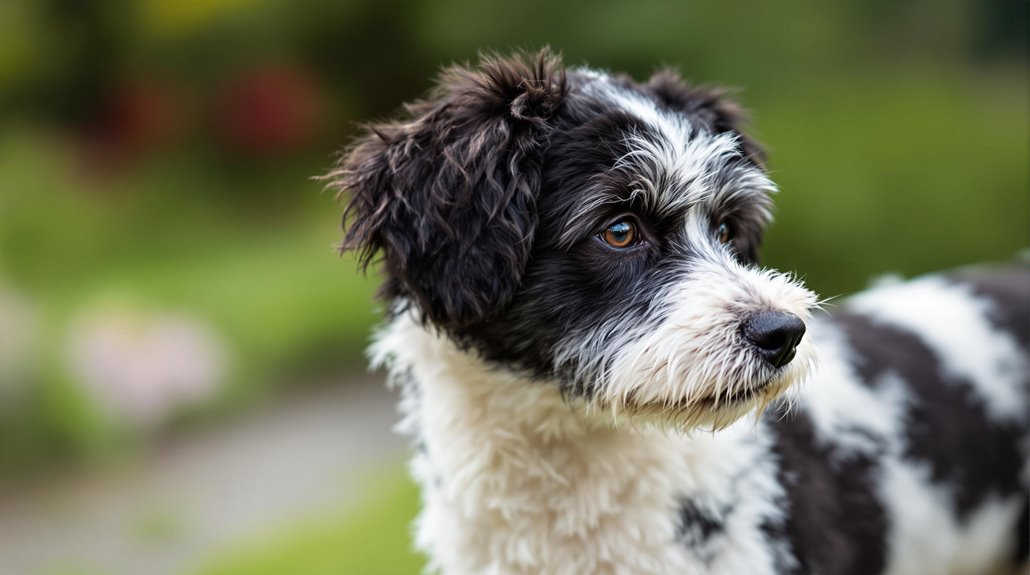
Finding the right Bossi-Poo requires careful research and consideration, as this designer breed's availability comes with both opportunities and challenges. When you're ready to welcome a Bossi-Poo into your home, you'll need to explore multiple avenues while being mindful of ethical concerns.
Consider these primary options for finding your new companion:
- Start by checking local shelters and breed-specific rescues, as adopting helps combat unethical breeding practices while potentially saving on costs
- If working with a reputable breeder, expect a financial commitment between $1,500 and $4,000 for a puppy
- Connect with established organizations like the Boston Terrier Club of America and Poodle Club of America Rescue Foundation for reliable referrals
Before making your decision, ascertain you:
- Research the physical and behavioral traits of both Boston Terriers and Poodles to understand potential characteristics
- Verify your chosen breeder's credentials and breeding standards
- Request health clearances and documentation for both parent breeds
- Be patient during your search, as finding the right Bossi-Poo from ethical sources may take time
Living With a Bossi-Poo
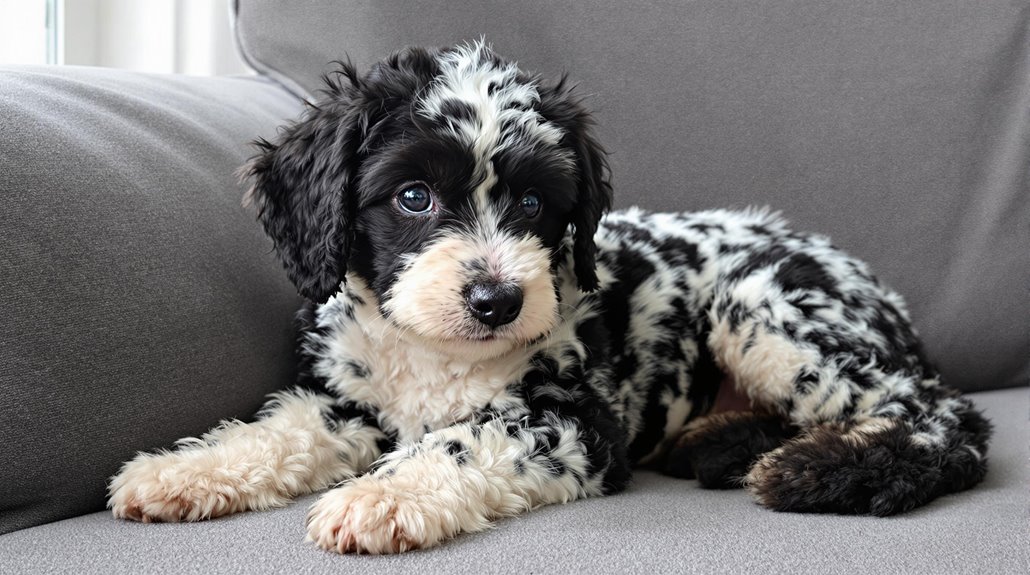
Life with a Bossi-Poo brings both joy and responsibility, as these energetic hybrid dogs require dedicated care to thrive in your home. Your daily routine will need to include 30-60 minutes of exercise to keep your furry friend mentally and physically healthy.
Regular grooming is essential for maintaining your Bossi-Poo's coat health. You'll need to brush them once or twice weekly, paying special attention if they've inherited the Poodle's curly coat texture. This routine prevents matting and keeps their coat clean and manageable.
To prevent separation anxiety, you'll want to guarantee your Bossi-Poo receives plenty of companionship throughout the day. These social dogs don't do well when left alone for extended periods, so you'll need to plan accordingly with family members or pet sitters when you're away.
Training your Bossi-Poo can be a rewarding experience, thanks to their intelligent nature. You'll find success by:
- Starting socialization early
- Maintaining consistent training sessions
- Using positive reinforcement techniques
- Establishing clear boundaries
- Providing mental stimulation through interactive play
With proper care and attention, your Bossi-Poo will become a cherished member of your household.
Designer Hybrid Dog Status

As a designer hybrid, you'll find that the Bossi-Poo's recognition varies among different canine registries, with organizations like the ACHC and DBR officially acknowledging this mixed breed. The cross-breeding process typically involves first-generation (F1) mating between purebred Boston Terriers and Poodles, though some breeders now work with second and third-generation crosses to establish more consistent traits. While these designer registries have established basic standards for the Bossi-Poo, you'll notice that the breed characteristics aren't as strictly defined as those for traditional purebred dogs.
Mixed Breed Official Recognition
The Bossi-Poo has earned recognition as an official designer hybrid dog through several respected organizations, including the American Canine Hybrid Club (ACHC) and the Designer Breed Registry (DBR). As a mixed breed combining the Boston Terrier and Poodle, you'll find that this designer breed meets specific standards established by these registries.
While you won't find the Bossi-Poo in the American Kennel Club's registry, you can be confident in its status as a recognized designer breed through other reputable organizations. The Dog Registry of America, Inc. (DRA) helps maintain breeding standards that you'll want to take into account when looking for a Bossi-Poo puppy.
What makes this mixed breed particularly interesting is how it represents the evolution of designer dogs in modern breeding practices. You'll notice that organizations supporting hybrid breeds focus on:
- Maintaining consistent breeding standards
- Documenting lineage information
- Promoting responsible breeding practices
- Recording physical and behavioral traits
This official recognition guarantees that when you're contemplating a Bossi-Poo, you're choosing a mixed breed with established guidelines and documented characteristics from both parent breeds.
Generations Of Cross-Breeding
Modern breeding practices have created distinct generational variations of the Bossi-Poo, each with unique genetic combinations. You'll find several different types of these designer dogs, depending on how they're bred:
- F1 Generation
- First-time cross between purebred Boston Terrier and Poodle
- Most unpredictable mix of traits from both parents
- Equal genetic contribution from each breed
- F2 Generation
- Result of breeding two F1 Bossi-Poos together
- Wider variety of possible characteristics
- May express more dominant traits from either parent
- F1B Generation
- Backcross between F1 Bossi-Poo and purebred Poodle
- Often created to enhance Poodle traits like non-shedding coat
- Results in 75% Poodle genetics
When you're considering a Bossi-Poo, it's important to understand these generations as they'll affect your dog's characteristics. Each generation can produce different physical features, temperaments, and health considerations. Responsible breeders will help you understand which generation might best suit your needs, though they'll also remind you that mixed-breed genetics aren't entirely predictable.
Designer Dog Registry Standards
Understanding breed generations sets the stage for recognizing the Bossi-Poo's status in official registries. As a designer dog combining the Boston Terrier and Poodle breeds, the Bossi-Poo has gained recognition from several respected organizations that oversee hybrid dogs.
You'll find the Bossi-Poo listed with these major registries:
- American Canine Hybrid Club (ACHC)
- Designer Breed Registry (DBR)
- Designer Dogs Kennel Club (DDKC)
- Dog Registry of America, Inc. (DRA)
These organizations work to establish and maintain standards for mixed breeds like the Bossi-Poo. When you're considering a Bossi-Poo, it's important to know that these registries help guarantee:
- Responsible breeding practices
- Health monitoring
- Temperament consistency
- Documentation of lineage
While the Bossi-Poo's characteristics can vary due to its mixed heritage, registry recognition helps you understand what to expect from this hybrid breed. The registries acknowledge this natural variation while promoting breeding practices that maintain the best qualities of both parent breeds. You'll benefit from their guidelines when seeking a reputable breeder or learning about your Bossi-Poo's potential traits.
Mixed-Breed History Began 1990S

During the 1990s, Bossi-Poos emerged out of the growing designer dog movement, combining Boston Terrier and Poodle bloodlines to create a distinctive hybrid breed. Breeders aimed to develop a companion dog that would blend the best traits from both parent breeds while addressing the increasing demand for low-shedding pets.
You'll find that the Bossi-Poo's development reflects a calculated approach to mixed-breed dogs, with breeders specifically targeting:
- The Boston Terrier's friendly personality and playful nature
- The Poodle's intelligence and hypoallergenic coat qualities
- A size suitable for both apartment living and family homes
If you're considering a Bossi-Poo, it's important to understand that these dogs don't follow standardized breeding patterns. Each puppy can display different characteristics, even within the same litter. This variation extends to:
- Physical appearance
- Size and build
- Coat type and texture
- Temperament and personality traits
Since there aren't formal breeding programs governing Bossi-Poo development, you'll need to research individual breeders carefully. The genetic diversity in these dogs means you can't predict exactly how your puppy will develop, though you can expect a blend of both parent breeds' characteristics.
Compact, Muscular Build
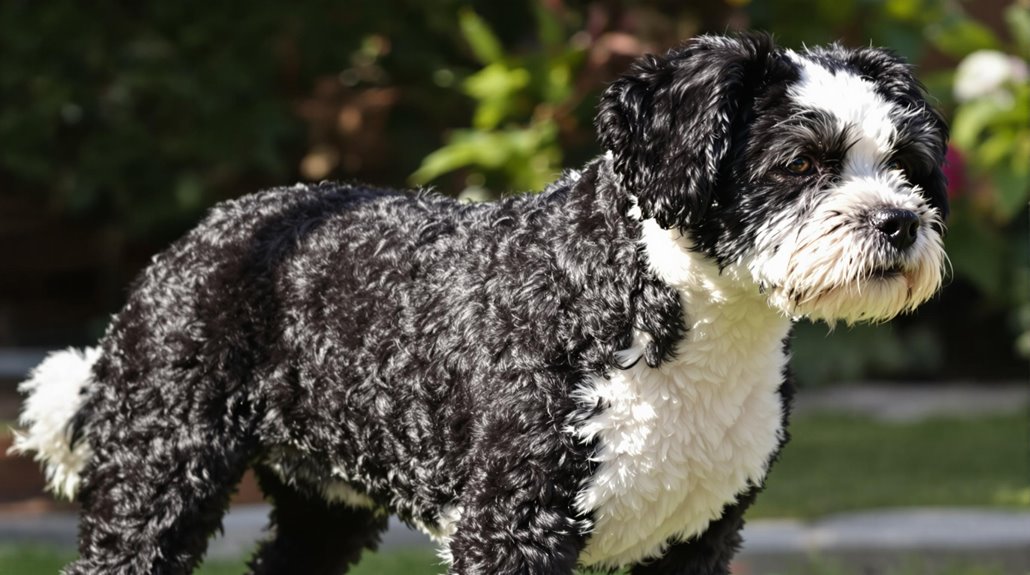
Your Bossi-Poo will display a compact yet muscular frame, typically weighing between 0-20 pounds when fully grown. You'll notice their distinctive medium-length fur has a wavy texture that combines characteristics from both the Boston Terrier and Poodle parents. To maintain their coat's health and prevent matting, you'll need to commit to regular brushing sessions throughout the week.
0-20 Pounds Average Weight
The Bossi-Poo's compact, muscular build typically ranges from 10 to 25 pounds, making it an ideal size for both apartment living and family homes. You'll find this breed's weight varies considerably depending on whether the Poodle parent is a Toy, Miniature, or Standard variety. When you're considering a Bossi-Poo, you'll notice the Boston Terrier influence in their muscular structure.
Most breeders specifically choose Miniature Poodles for crossbreeding to achieve a preferable size that combines the best traits of both parent breeds. You'll typically see these dogs standing 10 to 15 inches at the shoulder, creating a well-proportioned appearance that's neither too small nor too large.
Key Weight Characteristics:
- Standard range: 10-25 pounds
- Height: 10-15 inches at shoulder
- Most common: Miniature Poodle cross size
- Build: Compact and muscular
The weight of your Bossi-Poo will impact their exercise needs and living requirements. You'll need to provide regular physical activity to maintain their muscular build and prevent weight gain, regardless of where they fall within the typical weight range.
Wavy, Medium-Length Fur Patterns
Alongside their distinctive size and build, Bossi-Poos showcase a unique coat that combines traits from both parent breeds. Their wavy, medium-length fur patterns reflect the elegant qualities of the Poodle mix while maintaining a manageable length that's practical for most owners.
You'll notice that Bossi-Poo coat types can vary considerably among individual dogs:
- Some inherit mainly wavy fur that's characteristic of their Poodle ancestry
- Others display a blend of textures that's easier to maintain than pure Poodle fur
- Color variations include classic black, chocolate, golden, and white combinations
When it comes to grooming your Bossi-Poo, you'll need to reflect on their specific coat inheritance. Dogs with curlier, more Poodle-like fur will require:
- Regular brushing (2-3 times per week)
- Professional grooming every 6-8 weeks
- Special attention to prevent matting
If your Bossi-Poo's coat leans toward the Boston Terrier influence, you'll find maintenance is generally easier. However, all coat variations benefit from consistent grooming routines to maintain their appearance and health. Many owners appreciate that these mixed-breed coats tend to be more manageable than pure Poodle fur while still retaining attractive wavy characteristics.
Regular Brushing Prevents Matting
Maintenance becomes essential when caring for a Bossi-Poo's distinctive coat, particularly given their compact and muscular build. Regular brushing serves as the foundation of proper grooming, helping you prevent uncomfortable matting and maintain your dog's overall health.
Your Bossi-Poo's coat type will determine the specific care requirements, but you'll typically need to brush their fur 1-2 times per week. If your dog has inherited more Poodle-like characteristics, you'll want to pay extra attention to preventing tangles in their curly or wavy coat.
Key Brushing Guidelines:
- Establish a consistent schedule based on your dog's unique coat texture
- Focus on removing dirt and debris that can affect skin health
- Check for matting, especially in areas prone to tangling
- Combine brushing with crucial health checks of ears, teeth, and nails
Remember that proper grooming isn't just about appearances – it's a fundamental part of your Bossi-Poo's healthcare routine. You'll need to adjust your brushing technique and frequency based on your dog's individual needs, ensuring their coat stays healthy and mat-free throughout all seasons.
Playful yet Attentive Companion
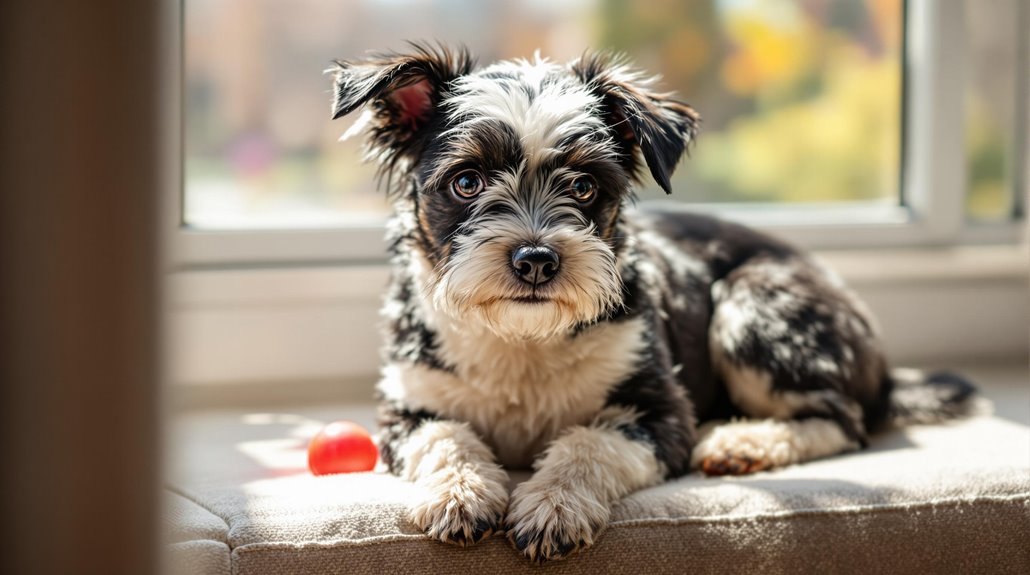
Your Bossi-Poo's quick-thinking nature and problem-solving abilities make training sessions both productive and entertaining, as they'll enthusiastically master new commands and puzzle toys. You'll find their playful energy pairs well with supervised toddlers, making them excellent family companions while maintaining their watchful nature. Daily walks combined with interactive fetch sessions will keep your Bossi-Poo mentally sharp and physically satisfied, helping channel their energy into positive activities.
Quick Problem-Solving Abilities
Armed with exceptional intelligence from both parent breeds, the Bossi-Poo stands out as a quick-thinking companion who excels at mastering new commands and solving complex puzzles. You'll find these intelligent dogs thrive on regular training sessions that challenge their active minds and reinforce positive behaviors.
To maximize your Bossi-Poo's problem-solving potential, you'll want to incorporate:
- Interactive puzzle toys that encourage strategic thinking
- Agility exercises that combine physical activity with mental challenges
- Daily training routines that introduce new commands gradually
- Games that reward observation and quick responses
Your Bossi-Poo's natural attentiveness makes them particularly receptive to mental stimulation through varied activities. They'll often watch you closely, picking up on subtle cues and adapting their behavior accordingly. This awareness, combined with their enthusiasm to learn, creates an ideal foundation for advanced training.
Remember to maintain consistency in your training approach, as these dogs respond best to clear, structured guidance. Their high energy levels and sharp minds require regular engagement, so you'll want to rotate through different activities to keep them mentally stimulated and prevent boredom.
Great With Supervised Toddlers
Bouncing with endless energy and affection, Bossi-Poos make exceptional companions for toddlers when properly supervised. These playful pups bring the perfect blend of intelligence and gentleness to create meaningful interactions with your little ones.
You'll find that Bossi-Poos excel at learning commands that promote safe play with toddlers. Their quick-learning nature allows you to teach them appropriate behaviors, such as gentle play and respecting boundaries. When you socialize them early, they'll develop a natural understanding of how to interact with young children.
The breed's affectionate disposition creates strong bonds with family members, especially toddlers. You'll notice how they adjust their energy levels during playtime, making them ideal playmates for developing children. Their active nature encourages:
- Physical development through interactive play
- Motor skill enhancement during supervised activities
- Social growth through positive interactions
To guarantee successful relationships between your Bossi-Poo and toddler:
- Always supervise playtime sessions
- Establish clear boundaries early on
- Reward gentle, appropriate behavior
- Maintain consistent training routines
- Create structured play environments
These measures will help foster a safe, nurturing relationship between your Bossi-Poo and young child.
Daily Walks Plus Fetch Sessions
Exercise enthusiasts will find their perfect match in the Bossi-Poo, a breed that thrives on 30-60 minutes of daily physical activity. You'll need to incorporate regular daily walks into your routine to maintain your dog's physical and mental well-being.
Combining daily walks with fetch sessions creates the perfect exercise routine for your Bossi-Poo:
- Morning walks help kickstart their day and prevent excess energy buildup
- Afternoon fetch sessions provide mental stimulation while burning energy
- Evening strolls help wind down your pet before bedtime
You'll notice that consistent exercise helps prevent common behavioral issues:
- Reduces hyperactivity in the home
- Minimizes separation anxiety
- Maintains a balanced temperament
- Strengthens your bond through shared activities
When you engage your Bossi-Poo in outdoor activities, you're not just providing exercise – you're fulfilling their need for socialization and environmental enrichment. Make fetch sessions interactive by using different toys and varying the game's intensity. Your commitment to regular exercise will result in a well-adjusted, happy companion who's ready to match your active lifestyle.
Hip Dysplasia Screening Essential
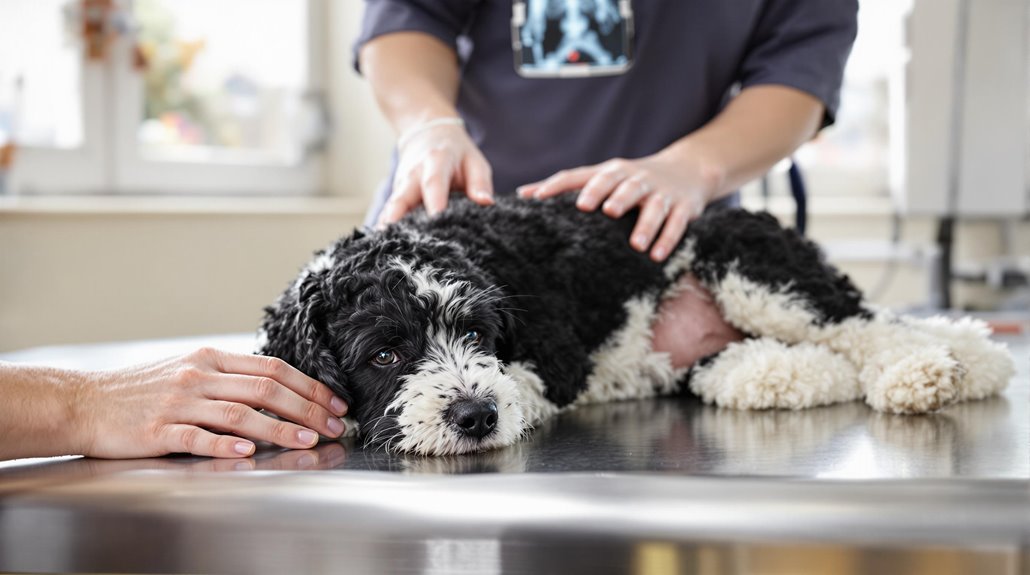
Your Bossi-Poo's long-term health requires attention to several key conditions, including hip dysplasia and patellar luxation, which need regular veterinary monitoring throughout their 2-15 year lifespan. Hip dysplasia screening should begin early through X-rays, while your vet will check for signs of knee cap issues during routine examinations. Along with these orthopedic screenings, you'll need to schedule annual dental cleanings to maintain your Bossi-Poo's overall health and prevent complications that could affect their quality of life.
Patellar Luxation Requires Monitoring
The health of your Bossi-Poo's joints deserves special attention, particularly when it comes to patellar luxation and hip dysplasia. As a conscientious pet owner, you'll need to monitor your dog regularly for signs that indicate potential joint problems, especially concerning the kneecap's position.
Watch for these key indicators of patellar luxation:
- Sudden limping or skipping steps
- Difficulty climbing stairs
- Reluctance to exercise
- Signs of discomfort when moving
Due to their mixed breed heritage, Bossi-Poos can inherit joint conditions from both parent breeds. You'll want to establish a monitoring routine with your veterinarian to catch any issues early. Regular check-ups and screening can make a significant difference in managing these conditions effectively.
If you notice any changes in your dog's movement patterns, don't wait to seek professional help. Early intervention often leads to better outcomes and can prevent more severe complications. Your veterinarian can provide specific guidance on:
- Appropriate exercise levels
- Preventive measures
- Weight management strategies
- Potential treatment options
2-15 Years Average Lifespan
Living well beyond their five-year milestone, Bossi-Poos typically enjoy a lifespan of 10 to 15 years when provided with proper care and regular health screenings. You'll find that this average lifespan matches what you'd expect from both Boston Terrier and Poodle parent breeds.
To help your Bossi-Poo reach their full life expectancy, you'll need to focus on several key health factors:
- Regular hip dysplasia screenings, which are essential for detecting this common health concern early
- Consistent vet check-ups to monitor joint health and overall wellness
- Balanced nutrition to maintain a healthy weight and support joint function
- Appropriate exercise routines that don't overstrain developing joints
As you care for your Bossi-Poo, remember that their mixed breeding can mean inheriting health predispositions from both parent breeds. By staying proactive with health screenings and maintaining a proper diet and exercise regimen, you're giving your dog the best chance at a long, healthy life. Don't forget that early detection of conditions like hip dysplasia can lead to better management and improved quality of life throughout their years.
Annual Dental Cleaning Checkups
Maintaining your Bossi-Poo's overall health starts with regular dental cleaning checkups, which directly impact their longevity and quality of life. You'll need to schedule annual dental cleaning checkups to prevent serious health complications that can arise from poor oral hygiene.
Periodontal disease is particularly common in small to medium-sized breeds like the Bossi-Poo, making preventive care essential. Your veterinarian will recommend a cleaning schedule based on your dog's specific needs, though most Bossi-Poos require at least one professional cleaning per year.
Key Dental Care Requirements:
- Schedule professional cleanings annually, or more frequently if recommended
- Maintain daily dental hygiene through regular tooth brushing
- Provide dental treats and toys designed for oral health
- Monitor for signs of dental issues between checkups
Remember that dental care isn't just about clean teeth—it's about protecting your Bossi-Poo's overall health. Additionally, while focusing on dental care, don't forget to discuss hip dysplasia screening with your vet, as this genetic condition can affect mixed breeds and requires regular monitoring.
Daily Coat Brushing Needed
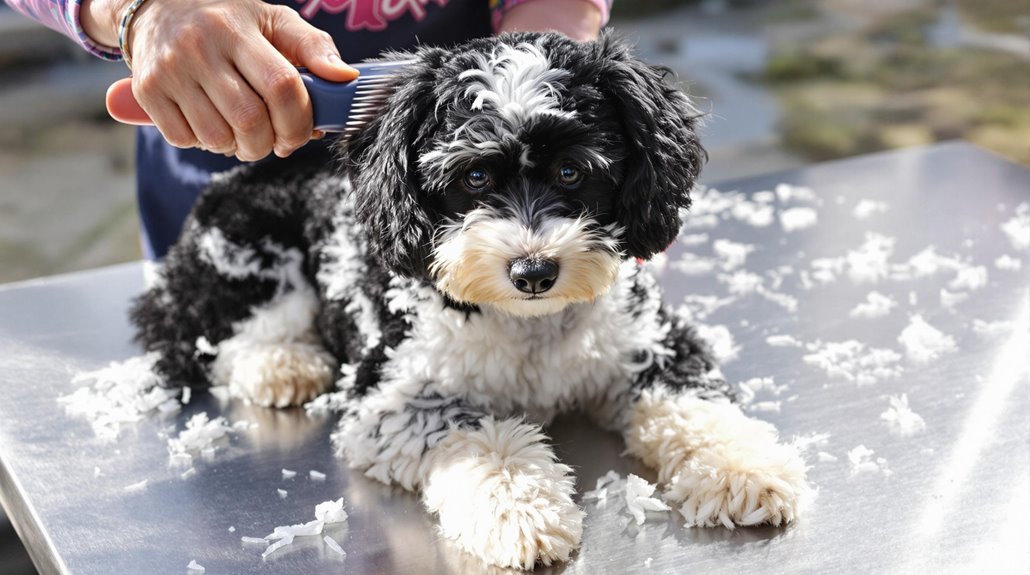
Regular coat maintenance for your Bossi-Poo typically requires brushing one to two times per week, though this frequency may increase if your dog inherits the Poodle parent's curly coat texture. Proper grooming helps prevent matting and tangling while reducing shedding throughout your home.
To maintain your Bossi-Poo's coat effectively, you'll need the right tools and routine. A slicker brush and comb are essential implements for working through the coat's different layers. Combined with regular bathing as needed, these grooming sessions help keep your dog's coat healthy and manageable.
Here's what consistent coat maintenance can do for your Bossi-Poo:
- Prevents painful mat formation that can lead to skin irritation
- Creates bonding opportunities between you and your pet during grooming sessions
- Helps you spot any skin issues or abnormalities early
Remember to include ear cleaning and nail trimming in your grooming routine for complete coat care. If you're finding it challenging to manage your Bossi-Poo's coat, consider increasing the brushing frequency or consulting a professional groomer who can demonstrate proper techniques for your dog's specific coat type.
Monthly Grooming Fees Average $75
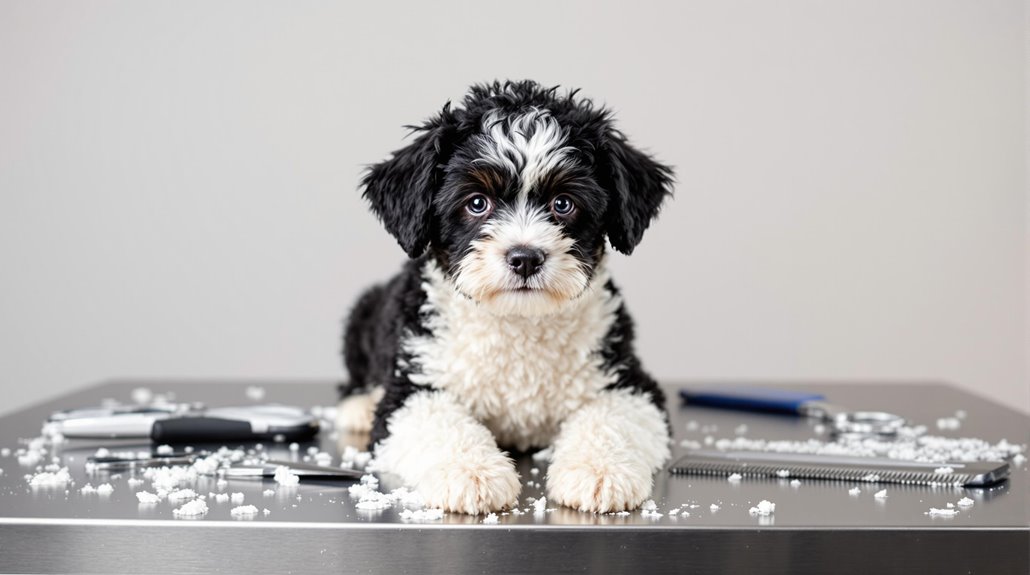
Professional grooming expenses for your Bossi-Poo typically average $75 per month, though costs can fluctuate based on your location and your dog's specific needs. The frequency of grooming sessions will depend largely on your dog's coat type, with curlier coats requiring more frequent maintenance.
| Service Type | Basic Package | Premium Package | Full Service |
|---|---|---|---|
| Regular Trim | $60 | $75 | $90 |
| Bath & Brush | $45 | $60 | $75 |
| Full Groom | $70 | $85 | $100 |
When budgeting for monthly grooming fees, you'll need to take into account additional supplies beyond professional services. These typically include:
- Professional grooming sessions every 4-6 weeks
- Home maintenance supplies like brushes and combs
- Quality dog shampoo and conditioner
- Nail trimming tools
If your Bossi-Poo has inherited more Poodle-like characteristics in their coat, you can expect to schedule more frequent grooming appointments. While this might increase your monthly expenses, regular maintenance helps prevent matting and keeps your dog's coat healthy. You'll find that investing in proper grooming care now can prevent costly coat-related issues later.
Research Breeder Backgrounds Thoroughly

Carefully researching breeder backgrounds stands as your most critical step when seeking a Bossi-Poo puppy. You'll want to prioritize breeders who demonstrate transparency about their responsible breeding practices and readily share health clearances for both parent breeds.
When evaluating potential breeders, focus on these key areas:
- Health Documentation: Request proof of testing for common issues like hip dysplasia and eye problems in both Boston Terrier and Poodle parents.
- Facility Inspection: Schedule a visit to observe the breeding environment firsthand. You'll gain valuable insight into how the dogs are housed and cared for daily.
- Client References: Ask for testimonials from previous buyers and follow up with them about their experiences with both the breeder and their puppies.
Consider these alternative options:
- Local shelters often have mixed-breed dogs needing homes
- Breed-specific rescue organizations may have Bossi-Poos available
- Regional adoption networks can help connect you with available dogs
Common Allergen Exposure Risks
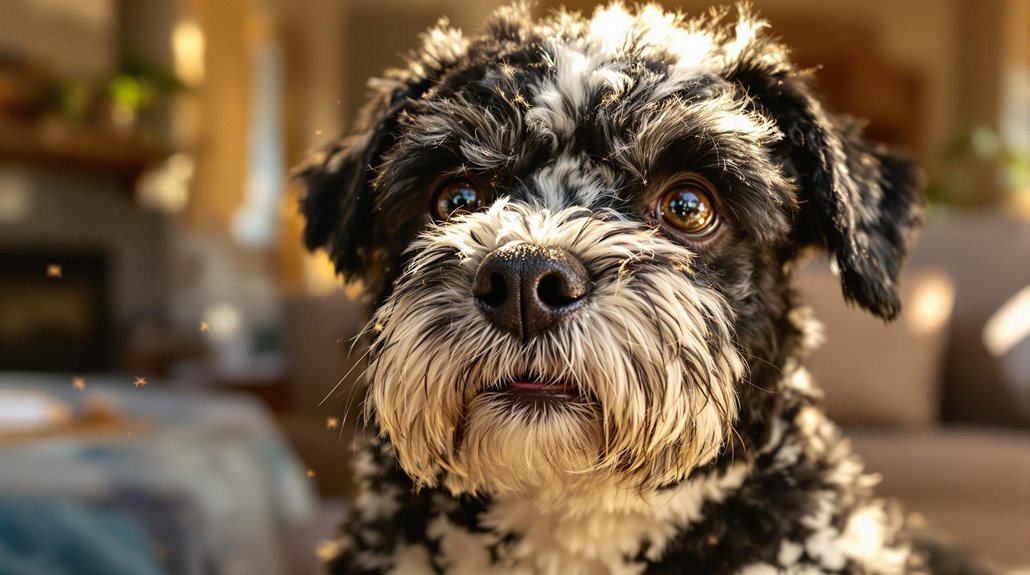
While finding a reputable breeder matters greatly, understanding allergen exposure risks will help you determine if a Bossi-Poo fits your household's health needs. These hybrid dogs inherit traits from both parent breeds, which means they can carry allergens from both Poodles and Boston Terriers.
Your Bossi-Poo's potential allergen sources include:
- Dander and loose fur (varies by individual dog)
- Saliva proteins
- Urine particles
- Environmental allergens they bring indoors
To minimize allergen exposure in your home, you'll need to maintain a consistent grooming routine. Regular brushing helps reduce loose hair and dander, while frequent cleaning of your living space removes accumulated allergens. You should also:
- Monitor your dog for signs of sensitivities, including excessive scratching or skin irritation
- Keep bedding and furniture clean where your dog rests
- Consider using air purifiers in main living areas
- Schedule regular professional grooming sessions
Remember that even though Poodles are known for being hypoallergenic, your Bossi-Poo may still trigger allergic reactions in sensitive individuals. It's crucial to spend time with similar dogs before committing to confirm compatibility with your household's allergy concerns.
Frequently Asked Questions
What Kind of Dog Is a Bossi-Poo?
A Bossi-Poo is a designer dog breed that combines a Boston Terrier and a Poodle. You'll find they're intelligent, friendly companions with moderate grooming needs due to their wavy or curly coat. When it comes to training tips, they're highly responsive and keen to learn. Their temperament traits include being playful, affectionate, and great with families. They can vary in size from small to medium, depending on the Poodle parent's size.
Is There a Boston Terrier Poodle Mix?
You'll find these adorable bundles of energy bouncing around in homes across America. The Boston Terrier-Poodle mix (Bossi-Poo) combines the best Boston Terrier traits like friendliness and playfulness with sought-after Poodle characteristics including intelligence and low-shedding coats. You'll enjoy mixed breed benefits such as hybrid vigor and a unique blend of personalities. These designer dogs typically weigh 10-25 pounds and make wonderful companions for families seeking a smart, affectionate pet.
How Long Does Bossi-Poo Live?
Your Bossi-Poo's lifetime expectancy typically ranges from 12 to 15 years. To maximize your pet's lifespan, you'll need to evaluate several health considerations, including regular vet check-ups, proper diet, and consistent exercise. Due to the breed characteristics inherited from both Boston Terrier and Poodle parents, you should watch for specific health issues like eye problems and hip dysplasia. With proper care and attention, your Bossi-Poo can live a happy, healthy life.
What Is the Most Cuddly Poodle Mix?
Picture a gentle ball of fluff curled up contentedly in your lap – that's what you'll get with the most cuddly poodle mixes. You'll find the Cavapoo leading the pack with its incredibly affectionate nature and strong desire for human companionship. The Maltipoo's loving temperament and lap-dog size make it another top contender for snuggles. If you're looking for a larger cuddle buddy, you can't go wrong with a Goldendoodle, known for its sweet, devoted personality.
Conclusion
You'll find the playful and precious Bossi-Poo brings together the best traits of both Boston Terriers and Poodles. Before bringing one home, make certain you're prepared for the daily brushing, regular grooming costs, and consistent exercise needs. While these darling dogs can make delightful companions, they require dedicated owners who'll devote time to training and health monitoring. Research reliable breeders thoroughly to guarantee you're getting a genuine Bossi-Poo that'll perfectly fit your family.
